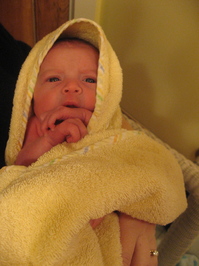The other night, Penny and William and I were reading Corduroy, a children’s book about a bear in a department store. A little girl saves her money to buy the bear. And they all lived happily ever after. As we were reading, Penny asked, “Mom, what’s a piggy bank?” I said, “Oh, it’s a place where you put money if you want to save it. Then after a while you can use the money to buy something.” She nodded. Made sense to her.
“Anyone who has grown up among family with Down syndrome knows that these dear people hampered by severe intellectual disability can do a few things well. Such as save money. They put coins and dollar bills in piggy banks religiously, and woe if you suggest opening or breaking the things. Money goes in and is to stay there for ages.
We smile at the naïveté. Everybody knows that cash devalues badly over the years. Smash a piggy bank filled four decades ago, and the insides will be worth one-sixth what they were originally, though there is a chance that the cash will have extra numismatic or metallic value. Neither of these things will register with the mentally handicapped saver. These afflicted ones know of saving money, but they know nothing of currency depreciation. They can and do collect and hoard, but not with an eye to hedging against face-value losses.
It is estimated that children with Down syndrome have an average IQ of 50, half the norm. The question arises: at what point on the intelligence scale does the concept of currency depreciation, and thus the dire necessity to earn return on one’s savings, register?”
He goes on to argue that we, as a society, should make sure that money keeps its value for the sake of people with low IQs who don’t know any better than to put their money in piggy banks. Of course, he also writes, people with low IQs (“the mentally handicapped”) are an inadvertent part of the problem because government programs exist to support them. If we didn’t have social services, the dollar would retain its value, and everyone would be better off. And then, in conclusion, he writes:
Government always seems to be convinced of the goodness of its own purposes, especially when it comes to social services and programs for the disadvantaged. Yet who would have guessed it would actually prove possible to make those who suffer from Down’s syndrome less practical than they already are? If we wish to judge ourselves by how we account for the least advantaged, it is time to get serious about confronting the devastating flaws in our fiat money system.

